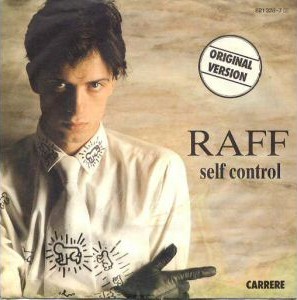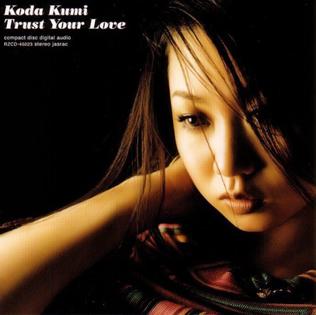
"Girls Just Want to Have Fun" is a song written, recorded and performed by American musician Robert Hazard, who released it as a single in 1979. It is best known for the version of American singer Cyndi Lauper, who covered the song in 1983. It was the first major single released by Lauper as a solo artist and the lead single from her debut studio album, She's So Unusual (1983). Lauper's version gained recognition as a feminist anthem and was promoted by a Grammy-winning music video. It has been covered, either as a studio recording or in a live performance, by over 30 other artists.

Kwon Bo-ah, known professionally as BoA, is a South Korean singer, songwriter, dancer, producer and actress. One of the most successful and influential Korean entertainers, she has been dubbed the "Queen of K-pop."

"Listen to Your Heart" is a song by Swedish rock duo Roxette, which was originally released in Sweden in September 1988 as the second single from the duo's second studio album, Look Sharp! (1988). It was written by Per Gessle with former Gyllene Tider guitarist Mats "M.P." Persson. The song went on to become one of the most successful singles of 1989, reaching number one in both the United States and Canada around November 1989. The track was the first song to reach number one in the US without a commercially released 7-inch single.

"Get the Party Started" is a song by American singer Pink, released on October 16, 2001, as the lead single from her second album, Missundaztood (2001). It received positive reviews and became an international success and reached the top ten in many countries, peaking at number one in Australia, Ireland, New Zealand, Romania, Spain, and the Walloon region of Belgium. The song was Pink's biggest-selling song at that time.

"Whenever, Wherever" is a song by Colombian singer-songwriter Shakira from her fifth studio album and English-language debut, Laundry Service (2001). It was released on 2 October 2001 by Epic Records as the lead single from the album. The song was written, composed, and produced by Shakira, with additional musical composition and production from Tim Mitchell, and additional lyrics written by Gloria Estefan in the English-language version. "Whenever, Wherever" is a mix of Latin music and worldbeat that is heavily influenced by Andean music. The Spanish version of the song, titled "Suerte", lyrically discusses how fortunate Shakira is to have found her romantic partner.

"Moments" is the thirty-second single released by Ayumi Hamasaki and her nineteenth number-one single. It came out March 31, 2004. "Moments" was the first single in 2004 released by Hamasaki. The single debuted at the number one spot for the daily, weekly and monthly Japanese charts and went on to sell over 310,000 copies throughout its release. "Moments" was also featured on the album My Story, which came out in December that same year.

"Walk Away" is a song by American pop singer Kelly Clarkson for her second studio album, Breakaway (2004). The song was written and produced by Chantal Kreviazuk, Raine Maida, and Kara DioGuardi, with additional writing from Clarkson. The song focuses on a relationship that is not working out; Clarkson wants a lover who will support her, not disappear when she needs him the most.

Best: First Things is the first compilation album released by Japanese pop singer Koda Kumi. It debuted at No. 1 on Oricon, giving her first number-one album, and became her longest charting album, staying on the charts for 124 weeks. The album included all of her a-sides released since her debut in 2000 with Take Back and became one of her highest selling albums, selling nearly two million copies as of 2007.

"Forever Young" is a song by German synth-pop band Alphaville from their 1984 debut studio album of the same name. The single was successful in Scandinavia and in the European German-speaking countries in the same year.

"Self Control" is a song by Italian singer Raf, released in 1984. It was written by Giancarlo Bigazzi, Steve Piccolo and Raf, and arranged by Celso Valli. The track topped the charts in Italy and Switzerland, and started the explosion and dominance of Italo disco-style recordings in continental European charts during the 1980s.

"Mr. Vain" is a song by German musical group Culture Beat, released in April 1993 as the lead single from their second studio album, Serenity (1993). It was written by Steven Levis, Nosie Katzmann and Jay Supreme, and produced by Torsten Fenslau. Tania Evans is the lead vocalist and Supreme is the rapper. The song achieved huge success worldwide, reaching the number-one position in at least 13 countries. In the United States, it peaked at number 15 on the Cash Box Top 100, number 17 on the Billboard Hot 100 and number two on the Billboard Dance Club Songs chart. In 1994, the song earned an award at the German Echo Award, in the category for "Best International Dance Single" and an award in the category for "Best Hi-NRG 12-inch" at the WMC International Dance Music Awards in the US.

"You Got the Love" is a song by British songwriting team The Source featuring American singer-songwriter Candi Staton. Originally released in 1986, the song was remixed and re-released in 1991, 1997, and 2006. It reached number three on the UK Singles Chart, number two on the UK Dance Singles Chart and number one on the UK Club Chart.

"Winter Love" is BoA's 21st Japanese single. It was released on November 1, 2006. It hit #2 on the Oricon Charts with sales of 42,481, making it the highest charting BoA single since "Do the Motion", which was released in March 2005. Formats are 「CD+DVD」 and 「CD only」.The single was released just before her twentieth birthday.

"Take Me to Your Heaven" was the winner of the Eurovision Song Contest 1999, performed in English by Charlotte Nilsson representing Sweden. Nilsson first won the Swedish Melodifestivalen 1999 when singing the Swedish-language version "Tusen och en natt".

Made in Twenty (20) is the fifth Japanese studio album by South Korean singer BoA. It was released on January 17, 2007, by Avex Trax. The title of the album refers to the fact that this is her first album since leaving her teenage years and her first album made in her 20s - specifically, when she was twenty years old. The album debuted with first-week sales of 182,009 copies, debuting at #1.

"I Want Candy" is a song written and originally recorded by the Strangeloves in 1965 that reached No. 11 in the US Billboard Hot 100 chart. It is a famous example of a song that uses the Bo Diddley beat.

"Automatic Lover (Call for Love)" is a song by German Eurodance/pop music project Real McCoy (also known as M.C. Sar & The Real McCoy), released in 1994 as the second single from their album, Another Night (1995), which is the US version of the project's second album Space Invaders. The song was produced by music producers Juergen Wind (aka J. Wind) and Frank Hassas (aka Quickmix) under the producer team name Freshline, and borrows the melody from Bronski Beat's 1984 song, "Smalltown Boy". It was a top 20 hit in a number of countries including Australia, Denmark, Germany and Sweden.

BoA has released more than 100 music videos since her debut in 2000, for songs performed in Korean, Japanese and English. Since 2003, BoA has released 15 video albums, primarily recordings of her concert tours in Japan. These video albums have been commercially successful in Japan and Taiwan, consistently reaching the top 10 in both regions. BoA's most successful video album is the music video collection 8 Films (2003), which was certified gold by the Recording Industry Association of Japan for 100,000 copies shipped to stores.

"Trust Your Love" is a song recorded by Japanese singer-songwriter Koda Kumi and was used as the second single from her debut album Affection (2002). It was released on May 9, 2001 via Rhythm Zone in two physical editions: a CD single and 12" vinyl. Additionally, Sounday and Orpheus Records distributed the song in North America with the same formats, but was remixed as a dance number by Hex Hector. The song was written by Kumi herself, whilst composing and production was handled by Kikuchi Kazuhito and Max Matsuura respectively. Musically, it is an R&B song that incorporates synthesizers and keyboards, and describes two lovers believing in each other.

"Everybody" is a song by Swiss Eurodance artist DJ BoBo, released in May 1994 as the fourth and last single from his debut album, Dance With Me (1993). It was very successful in Europe, reaching number-one in Finland, number two in Germany, and number three in Switzerland. Additionally, it was a top 10 hit in Iceland and the Netherlands, peaking at number eight and ten, respectively. The female vocals are performed by Jennifer Rüesch.



















